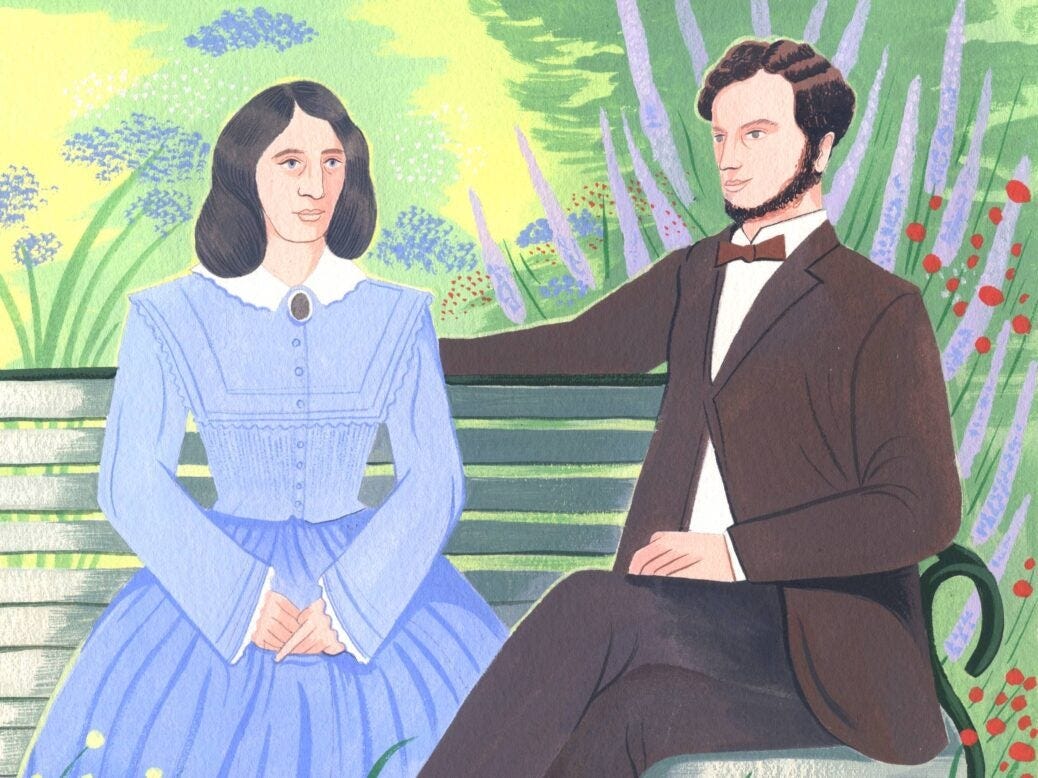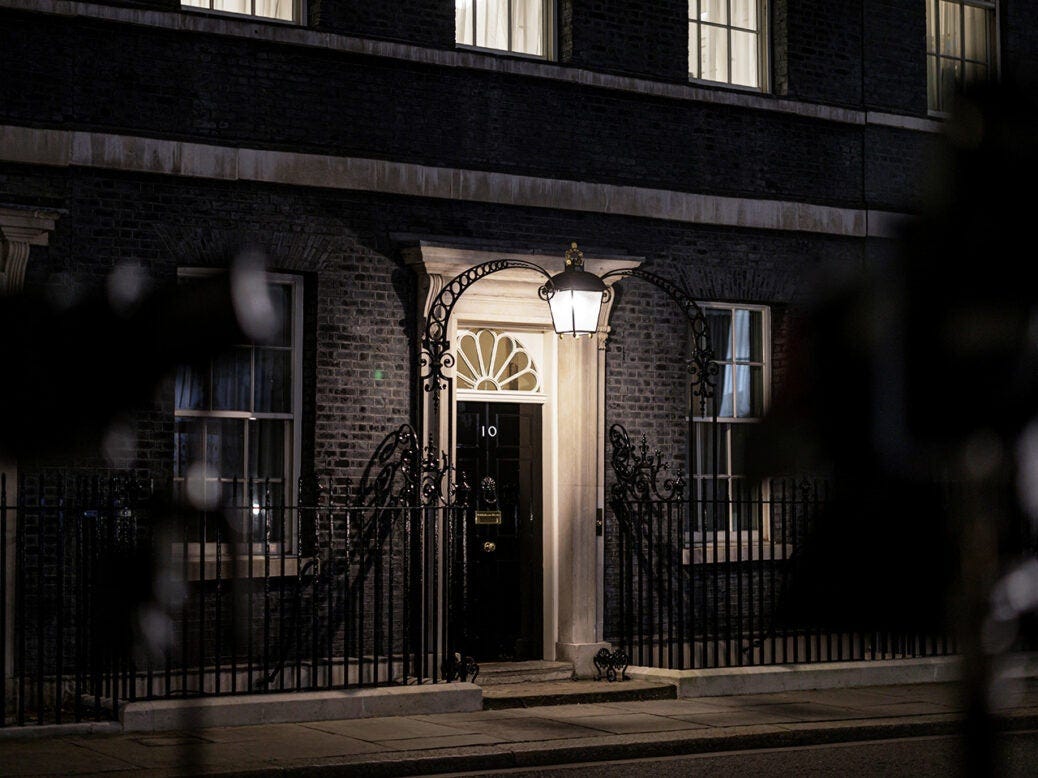The Saturday Read: Can liberalism and the left be reconciled?
Plus a bumper spring crop of pieces.
Good morning, and welcome to the Saturday Read, the New Statesman’s guide to the best writing on ideas, politics, books and culture each weekend. This is Will Lloyd. The Saturday Read’s editor, Harry Lambert, has posed this week’s question in today’s sign-off. We have eight pieces up front from the New Statesman, 15 links to pieces from across the media, and then a handful of other NS articles you might like.
I have been sifting through the comments and emails we received after last week’s edition (you can find some of them below). Thanks to everyone who weighed in on the vexed question of contemporary fiction. Many of you made suggestions for novels I ought to read.
The best recommendation I received, though, came “in real life” last weekend. Someone suggested I read Middlemarch, and then threw the novel at my head. Though it was a paperback edition, Eliot’s great work is still rather… heavy.
Are liberalism and the left in tension? Harry asks below. Let us know what you think by leaving a comment or replying to this email. If the pieces in today’s email intrigue, you could try a trial subscription to the NS – read three free articles after registering on our site. A digital subscription is just 95p a week. Let’s get to it.
1—“A consensus has now emerged about just how large the correlation is between social media use and mood disorders.”
HL — Jonathan Haidt, the social psychologist for our times, has written for this week’s NS on the disturbing link between social media and teenage depression. “Few parents,” Haidt writes, “would knowingly let their daughters become heavy users of anything shown to correlate with mental illness at this level.” Yet we are allowing a generation to be raised on smartphones that we know depress them. Haidt has the data. “Why would youthful mental illness rise steadily throughout the 2010s?” he asks.
It’s not because of the 9/11 attacks, wars in the Middle East, or school shootings. As Émile Durkheim showed long ago, people in Western societies don’t kill themselves because of wars or collective threats; they kill themselves when they feel isolated and alone. Also, why would American tragedies cause the epidemic to start at the same time among Canadian and British girls?
There is one giant, obvious, international and gendered cause: social media. Instagram was founded in 2010. The iPhone 4 was released then too – the first smartphone with a front-facing camera. In 2012 Facebook bought Instagram, and that’s the year that its user base exploded. By 2015, it was becoming normal for 12-year-old girls to spend hours each day taking selfies. The hours girls spent each day on Instagram were taken from sleep, exercise, and time with friends and family. The arrival of smartphones rewired social life for an entire generation. What did we think would happen to them?
2—“Americans got the point of Queen Elizabeth II. Her Maj was regal… Charles isn’t.”
HL — Tina Brown, the editor who created the modern Vanity Fair and went on to edit the New Yorker, has written this week’s NS diary. She makes two intriguing comparisons, between King Charles and his mother, and between Donald Trump and Timothy McVeigh, the Oklahoma City bomber – “McVeigh didn’t find his army… because he didn’t have social media.” Trump, who was indicted this week on felony charges, does.
Trump now basks in a narrative of prosecutorial overreach, a bellowing Gulliver held down by tightening legal threads. Yet how much have we truly learned from the last cycle of his political chaos? Cable news hosts, tanking in the ratings since the beginning of the snoozy Biden presidency, have relished the return of the Cirque du Trump.
A strength of Trump’s is that just when you think he can’t go lower, he does. On 24 March he posted a photo of himself wielding a baseball bat next to a picture of Bragg and threatening “death and destruction” should he be prosecuted. He hosted his first 2024 campaign rally in Waco, Texas, a site iconic to the far right since the botched FBI raid on the Branch Davidian cult in 1993, which ended with the deaths of 76 members.
3—“By late 2022 it finally dawned on a critical mass of people that they deserved better.”
WL — An enthralling essay from Justin EH Smith on the end of Twitter. Since the last months of 2022, and perhaps even before Elon Musk purchased the site, Twitter has been in decline. Nobody has captured the feeling of experiencing the death of a social media platform in real time quite as Smith does here.
I left Twitter mostly because I would rather aspire to love all of humanity than take sides with a single segment of it, and Twitter was making it hard to do this. I left at the peak of the frenzy surrounding Elon Musk’s takeover of the social media company. But I do not believe that Musk could make that site any more inhumane than it already was. Its inhumanity is by design, and reflects the economic model that its owners and investors hope will make it profitable. I have trouble seeing the defections from Musk-era Twitter as having Musk himself as their real cause. Defectors have used Musk as a pretext to get out of something they had already understood to be debasing, inhuman, and out of place in any well-lived life.
4—“If there be any one subject on which I feel no levity it is that of marriage…”
WL — A splendid, deeply engaged account of George Eliot’s marriage, and her radical philosophy of relationships from our critic Anna Leszkiewicz. I came to this essay cold, having never (embarrassingly) read Middlemarch – I may have mentioned – and left knowing far more than I did. Who knew Eliot was treated so awfully by her contemporaries?
Her early biographer Mathilde Blind describes Eliot’s “plain” face, “prominent under-lip” and “massive jaw”. (Such comments were not limited to her biographers: Dickens thought her one half of “the ugliest couple in London”.) The Victorians were struck by her big, “masculine” head residing on a “feminine” body – multiple biographers reference a phrenologist’s claim that Eliot’s skull showed she was “not fitted to stand alone” but needed “someone to lean upon”. Blind sees Eliot as victim of her “clinging, womanly nature”, whose “dormant faculties were roused” by Lewes. Gordon Haight’s biography from the mid 20th century repeats the phrenologist’s phrases.
5—“An old man who had stopped to look called them ‘the ships that steal the sand’.”
HL — Katie Stallard has been in Kinmen, which she describes as “Taiwan’s Crimea” in this week’s issue. Is this the place that China’s invasion of Taiwan will begin? (You can also listen to Katie’s piece as this week’s audio long read.)
Since Russia’s invasion of Ukraine last year, there have been growing fears in Washington that Taiwan is next. Some analysts fear that offensive would start in Kinmen or one of the other small island chains not covered by the Taiwan Relations Act, the legislation that commits the US to providing Taiwan with the means of self-defence.
Kinmen was the site of the last major confrontation between Mao Zedong’s People’s Liberation Army (PLA) and the Kuomintang (KMT) forces of Chiang Kai-shek, who established a rival government on Taiwan at the end of the Chinese Civil War in 1949. Thousands of PLA troops landed on Kinmen’s beaches that October, but they were repelled. The island’s defenders dug in, blasting a network of deep tunnels and fortifications into the steep granite cliffs, some of which are still in use.
6—“Architecture aims at eternity.”
HL — Michael Prodger, our inimitable art critic, has written the piece I’ve always wanted to read on Christopher Wren, the “man who built Britain”.
The celebrated photograph of the dome of St Paul’s floating celestial and unharmed above the smoking ruins of buildings bombed in December 1940 during the Blitz instantly became the defining image of British cussedness and exceptionalism – a 20th-century equivalent of the Armada Portrait of Elizabeth I.
We are, however, lucky to have as much of Wren’s work as we do. The Blitz destroyed 19 of his 52 city churches (53 including St Paul’s) – 13 alone on the night of 29 December 1940, during the raid captured in the St Paul’s photograph – and town planners and developers did for several more. His buildings fared badly before that too. Surprisingly, perhaps, the Victorians were no great admirers. In 1864 a writer in the Ecclesiologist described Wren’s churches as “ugly to an excess”, while in his essay “The City Churches” of 1898, Henry William Clarke bemoaned the “twaddle and cant” of the “Wren craze”.
7—“Perhaps the most galling thing about Friendaholic, however, is the banality of its advice.”
WL — A satisfyingly scathing review from Charlotte Stroud on podcaster-author Elizabeth Day. AA Gill used to say that his writing was “firm but fair”. Stroud writes in that tradition:
My relationship with Friendaholic was of the more “toxic” variety: like a frenemy, I loved to hate it. For much of the book I felt like I was rubbernecking a car crash, unable to tear my head away from the scene of the disaster. I felt this acutely in those moments when Day dishes on ex-friends, saying of one: “She told me she was frustrated and bored in her relationship, and was guiltily nurturing a workplace crush on a younger colleague.” I’m just glad Becca’s not her real name. Although a pseudonym provides thin protection from such a detailed character assassination.
At other times, it made me laugh out loud, like when, for example, Day earnestly tells us that “a best friend has even been shown to boost productivity”. Perhaps the most galling thing about Friendaholic, however, is the banality of its advice. I can’t think of any reader who would be glad to wade through 400-pages of Day’s anecdotes to be told that it is “quality not quantity” that counts.
8—“And, of course, we learn about burping fetishes.”
WL — An ice-cold Ann Manov review of Polly Barton’s Porn: An Oral History. Manov, who also wrote for the NS this week on Agnes Callard’s marriage, takes this piece from a straight review essay into something broader. Where, she asks, are all the good books on sex?
Recent “sex-negative” tracts The Case Against the Sexual Revolution by Louise Perry and Rethinking Sex by Christine Emba read as over-long op-eds, as might be expected of books by opinion writers. But even these reactionaries aren’t that provocative in their prescriptions. Perry declares: “We should treat our sexual partners with dignity.” Emba concludes: we must “will the good of the other”.
None of this is enough. We desperately need a book to go deeper: how do our desires come about? What should we do about them? Is it wrong to feel alienated from one’s sexuality? How can we treat others ethically? When is a “power imbalance” too much? What are the conditions for consent? There are paradoxes in the world of sex, and new norms are being violently hashed out. In the face of this, is there any unifying principle of sexual ethics whatsoever? As it is, it seems that sex is an arena in which no moral or philosophical progress can be made, even by those who bill themselves as its most astute observers.
Best of the Rest
Economist: Prosecuting Trump is dumb. I have never agreed with the Economist so much (writes Will).
Politico: How Keir Starmer learned to love Big Tech.
Tyler Cowen: AI will make us live in history again. A refreshingly mad take from Cowen, who also used ChatGPT to “interview” Jonathan Swift this week.
Tanner Greer: America’s lost virtues.
Helen Lewis: Ron DeSantis’s magic kingdom. There is a superb line about a peacock in here.
Garth Greenwell: In praise of filth.
Ross Douthat: How the right became radical and the left became depressed.
Why did Slavoj Žižek become so popular? A question I have often asked myself, as the man’s books are unreadable.
After every school shooting, just read this. Gary Wills is one of the greatest living writers, and this classy piece won’t be improved upon any time soon.
Elsewhere on the NS
“Team Trump claimed that the location was merely chosen for its proximity to other major Texan cities, the enthusiasm of its residents and its infrastructure. But the setting wasn’t the only nod to fervent religious belief.” Megan Gibson, our international editor, captured the mood at that revivalist Trump rally this week.
Who, asks Will Dunn, killed Royal Mail?
A personal essay from Gary Younge on how racism sharpened his critical eye.
“The group most keen to chastise a ‘metropolitan elite’ is a cabal of ex stockbrokers, bankers, lawyers, management consultants, columnists for broadsheet newspapers, and, indeed, current ministers of state.” Armando Iannucci on fiery form in this column.
“The pretence that Humza Yousaf offered any kind of fresh start lasted all of ten minutes.” Chris Deerin has you covered on Scotland’s new First Minister.
“Westminster is healing itself.” The future of the world economy, and the regulatory standards Britain must follow, is beyond British control, writes Andrew Marr. We need to focus on smaller but equally vital issues closer to home.
Anoosh explains how Britain became a country that never has enough time.“As a nation we are spending less time seeing our friends, eating at restaurants, going out, exercising and volunteering.”
Rachel Cooke takes a chainsaw to yet another rubbish adaptation of Great Expectations.
“Twelve days in and – acting on the AI’s instruction – he has launched a website, GreenGadgetGuru.com, attracted more than $7,000 in investment, and hired two freelancers to ‘create’ content by entering prompts into GPT and the AI image creator, Midjourney.” Chris Stone introduces us to the #HustleGPT movement.
Contemporary British Christianity is transforming in line with many of the wider demographic and cultural shifts occurring across the country, writes Tomiwa Owolade, in this excellent report on London’s African Christian scene.
If any of these pieces intrigue you, you can pick up the New Statesman spring special on newsstands now. You will find many of the pieces above, along with Michael Burleigh on the IRA bid to kill Thatcher, Rowan Williams on the limits of humanism and Edward Docx on the end of Boris the clown, as well Harry’s report from Wakefield if you missed it last week.
And with that…
Can liberalism and the left ever be reconciled? That’s what I’ve been thinking about this week. I’m working on a media story that is fundamentally about this question. It’s one the New Statesman has always asked itself: we were founded by Sidney and Beatrice Webb, whose leftism eventually led them to embrace Stalin, but we also count John Maynard Keynes, the great liberal economist, among our founding voices – after we merged with a magazine he chaired, Keynes served as a counterweight to Kingsley Martin, our anti-fascist, pro-communist editor, in the 1930s.
That decade was a fascinating time for the NS: HG Wells interviewed Stalin in 1934, with George Bernard Shaw criticising Wells for being insufficiently respectful in a follow-up article. In 1938, Martin refused to print George Orwell’s reporting from the Spanish Civil War. “It is an unfortunate fact,” Martin wrote to Orwell, “that any hostile criticism of the present Russian regime is liable to be taken as propaganda against socialism.”
That tension – between the liberal aim to report something that contradicts your beliefs, and the leftist aim to advance only the ideology you believe to be right – is playing out in our media today over lesser issues. I’m planning to re-read David Marquand’s The Progressive Dilemma (1991) for this piece, and to pick up the works of others I’ve long meant to read (JA Hobson, RH Tawney, etc). But what do you think: can liberalism and the left be reconciled? Are they in tension? What have you read or found to be enlightening on this? Let us know in the comments below or by replying.
This week’s replies
: “It is not a question of ‘What happened to novels?’ but rather one of ‘What has happened to the readers, or rather to the brains of readers?’ The answer to that can largely be found in the writings of Maryanne Wolf. Personally, I am currently rereading Middlemarch and discovering the real pleasure of ‘deep reading’ in a long novel.” recommends “Shrines of Gaiety by Kate Atkinson. Novels teach you about life and let you escape from life. And the best of them put into beautiful and clever words things you’d maybe thought but not realised. The Economist teaches you stuff but doesn’t make you feel like that.”: “Listen rather than read. 35 years ago it was books on cassettes, then CDs. Now it’s Audible on my phone or Alexa. From Crime and Punishment on 35 cassettes whilst driving up and down the A1 to Dickens, Greene, Orwell and Shute whilst in the gym or my room.”: “I’ve had two separate conversations about how wonderful fiction is in the last 24 hours – novels have so much to teach us about stories far from our own, they teach empathy, and are incredible insights into the human condition. And sometimes it’s just nice to get lost in a narrative!”: “Novels are going to make a comeback.”Thank you for reading. Don’t miss out – subscribe to the New Statesman and stay up to date with everything you need: from news and analysis to comment and criticism.
Whether you’re looking for a sharp blog or a finely written feature, the New Statesman has you covered. Have a good week, and catch you next Saturday.






















Liberalism and left "must" be recoinciled if we wont to defeat the degenerazion of conservative ( e g Trump). To do this we must follow the ideas and words of Keynes that wrote on these pages 80 years ago, about what for him means social liberism. I would like you reprint his words that are valid also in present times.
The left needs to stop blaming the world for not being as it wishes. Liberalism needs to stop assuming that freedom automatically creates truth. Our knowledge is measured by our ability to precisely and accurately predict what *will* happen; not by our ability to rationalise away what *has* happened. The biggest zealots of liberalism and of the left are all rationalists, not empiricists.